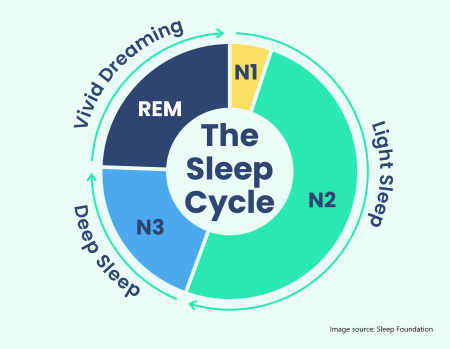Sleep isn’t a luxury. It’s an active, essential phase of your daily cycle that significantly impacts your health. At Iowa ENT Center, we emphasize the importance of recognizing common sleep disruptors, like snoring, not as mere nuisances but as potential contributors to deeper health issues. That’s why we evaluate snoring and other sleep disorders in our patients—and, when appropriate, may recommend snoreplasty, treatment of sleep apnea with a CPAP machine or Inspire therapy, or other treatment options.

Diving Deeper: The Critical Functions of Sleep
Let’s delve into the pivotal role of sleep and how snoring can disrupt your physical and emotional well-being. Sleep is the cornerstone of good health, serving multiple vital functions:
- Cellular repair and regeneration: During sleep, your body undergoes repair and regeneration processes, including muscle tissue growth, protein synthesis, and cell repair. This regeneration is crucial for maintaining physical health and supporting the immune system.
- Brain function and memory consolidation: Sleep plays a critical role in brain function. It helps consolidate memories, processing the day’s experiences into long-term memory. It’s also a time for the brain to clear out toxins and waste products, which can help prevent neurodegenerative diseases.
- Emotional and mental health: Adequate sleep is linked to better mood regulation, reduced stress, and a lower risk of mental health disorders. It allows the brain to rebalance its chemicals and hormones, affecting our emotions and cognition.
- Metabolic health: Sleep influences the hormones that regulate hunger (ghrelin) and fullness (leptin). Lack of sleep can disrupt these hormones, leading to increased appetite and potential weight gain. Over time, poor sleep can contribute to the risk of developing obesity, type 2 diabetes, and metabolic syndrome.
- Heart health: Quality sleep is vital for maintaining cardiovascular health. It regulates blood pressure and heart rate, reduces inflammation, and supports overall heart function. Chronic sleep deprivation is linked to an increased risk of heart disease, stroke, and hypertension.
- Gut health: Sleep plays a crucial role in maintaining a healthy gut, which is essential for digestion, immune function, and overall well-being. A lack of quality sleep can disrupt the balance of gut bacteria, leading to digestive issues, increased inflammation, and a heightened risk of gastrointestinal disorders.
The Phases of Sleep
Sleep is a complex process that cycles through several stages, each serving distinct and vital functions. Here’s a brief overview of the different stages of sleep and their contributions to our health.
Stage 1 (N1): Light sleep
This initial phase of sleep is the transition from wakefulness to sleep. It’s a short period that lasts for several minutes, allowing the body to slow down its functions. During this stage, muscle activity decreases, and the eyes move slowly. It helps the body relax and prepare for deeper sleep.
Stage 2 (N2): Deeper sleep
In this stage, the body enters a more stable sleep. Heart rate and breathing rate slow down, and body temperature drops. This phase makes up the largest portion of our sleep cycle. It’s crucial for further relaxing the body, leading to physical restoration and energy conservation.
Stage 3 (N3): Deep sleep
Also known as slow-wave sleep, this is the most restorative phase of sleep. It’s during this stage that the body repairs muscles and tissues, stimulates growth and development, boosts immune function, and builds up energy for the next day. Deep sleep is essential for physical recovery and health.
Rapid eye movement (REM) sleep
Following deep sleep, the REM stage is where most dreaming occurs. The eyes move rapidly in different directions (hence the name) and brain activity increases, but the body remains relaxed and immobilized. REM sleep is crucial for cognitive functions, such as memory consolidation, learning, and emotional processing.
The importance of maintaining the sleep cycle
Cycling through these stages multiple times throughout the night ensures that the body and mind are adequately rested and rejuvenated. Disruptions in the sleep cycle, particularly in deep and REM sleep, can impact physical restoration, cognitive function, and emotional regulation.
The Disruptive Role of Snoring
Snoring is more than just a noise issue. It can significantly impact health by disrupting the natural sleep cycle and reducing the quality of sleep—both for the person who snores and potentially for those nearby. The disruptive role of snoring in health can manifest in several ways.
Impact on sleep stages
Snoring can interfere with the ability to reach and maintain the deeper, more restorative stages of sleep (N3 and REM). The noise and irregular breathing patterns associated with snoring can cause frequent awakenings (often unnoticed), preventing the smooth transition through the sleep stages. This disruption can result in a decrease in time spent in deep and REM sleep, which are critical for physical repair, cognitive function, and emotional regulation.
Oxygen levels and cardiovascular health
Frequent or loud snoring may be a sign of obstructive sleep apnea (OSA), where the airway becomes partially or completely blocked—leading to pauses in breathing. These pauses can cause drops in blood oxygen levels, triggering the body to briefly wake up to reopen the airway. This cycle can happen dozens or hundreds of times a night, significantly disrupting sleep and increasing the heart rate and blood pressure. Over time, this can lead to chronic cardiovascular issues, including hypertension, heart disease, and stroke.
Metabolic effects
The fragmented sleep resulting from snoring and its potential to cause sleep apnea can impact metabolic health. Poor sleep quality is associated with changes in hormones that regulate hunger and satiety, leading to increased appetite and a preference for high-calorie foods. This can contribute to weight gain and an increased risk of metabolic syndrome and type 2 diabetes.
Cognitive and emotional consequences
The disruption of sleep caused by snoring can lead to daytime fatigue, decreased cognitive function, and mood disturbances. The lack of restorative sleep can impair memory, concentration, and decision-making abilities. It can also lead to irritability, anxiety, and an increased risk of depression.
Relationship strain
Snoring can also have social implications, particularly for those sharing a sleeping space with a snorer. It can disrupt the sleep of a partner, leading to sleep deprivation for them as well. This can strain relationships, with both parties experiencing increased irritability and decreased overall well-being.
Evaluation and Treatment of Snoring
Given the broad impacts of snoring on health, addressing this issue is crucial. The first step is an evaluation by an ear, nose, and throat (ENT) physician. At Iowa ENT Center, your physician will start with a comprehensive medical history and a physical examination to identify any structural issues that may contribute to snoring.
In some cases, we may recommend a sleep study, or polysomnography, which can be conducted in a sleep lab or at your home. This study records various body functions during sleep, including breathing patterns, blood oxygen levels, heart rhythms, and muscle activity. This data helps us determine if you may have sleep apnea.
Depending on the outcome of your evaluation, your Iowa ENT physician may recommend:
- Lifestyle changes such as weight management, changing sleep positions, avoiding alcohol and sedatives, and maintaining good sleep hygiene
- Medication to help alleviate nasal congestion
- Snoreplasty, a non-surgical treatment, if you have problem snoring but not sleep apnea
- Treatment with a CPAP machine or other options if you have sleep apnea
- Inspire therapy for mask-free snoring relief
To Schedule an Appointment
New patients are always welcome at Iowa ENT Center, and we never require a referral. To schedule an appointment, call us at 515-223-4368 or request an appointment online.
